UNSC's Myanmar Trip: Naypyidaw to 'try to fix ties with world'
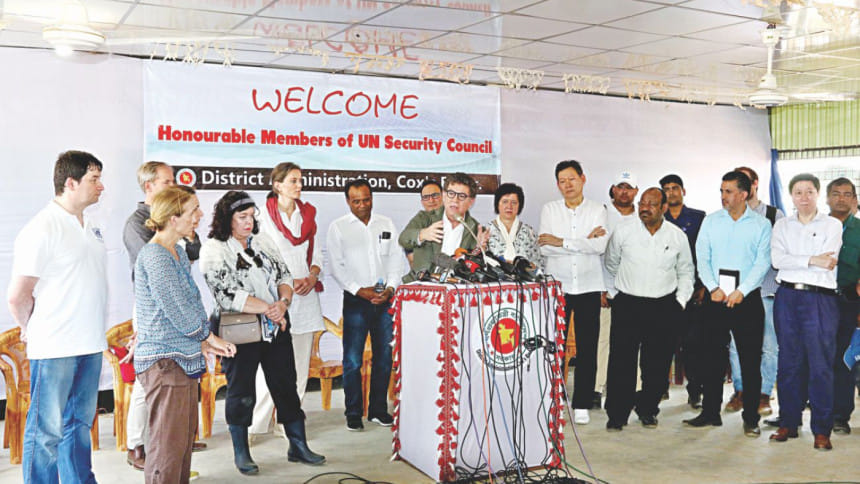
As the UNSC delegation begins visiting Myanmar today its government will make an effort to repair its strained relationship with the international community and allow some of the Rohingyas to return to Rakhine State, said a Financial Times report yesterday.
“The trip is part of an effort by Aung San Suu Kyi's civilian government to repair its relations with the international community and make good on a pledge to allow some of the people driven from their homes to return to northern Rakhine State, the centre of one of the world's worst humanitarian crises,” it read.
The newspaper, quoting an adviser to the Myanmar leader, reported that the visit was “part of a careful process” to bring the UN into resolving the crisis in northern Rakhine.
“This will offer the opportunity for a meaningful partnership to help the civilian government resolve the crisis,” said the adviser, who was not named in the report.

International media has been giving widespread coverage to the four-day visit of the UNSC to Bangladesh and Myanmar to address one of the world's worst refugee crises, stemming from the forced migration of Rohingyas.
The international media highlighted the exodus as one of the worst human rights crises, which needed to be resolved urgently to avoid instability in Bangladesh and Myanmar.
The AP, Reuters, AFP, and The Gurdian, The New York Times, Washington Post, Deutsche Welle, US News, The Hill, The Peninsula Qatar, Inner City Press, Business Line, Bahrain News Agency, Asian Tribune, Eastern Mirror, The Arab Weekly, Times of Malta, aljazeera.com, Gulf Digital News, Firstpost, The Nation, Kuwait News Agency, PTI, and The Seattle Times among other media organisations have been releasing and publishing reports on the UNSC visit prominently.
However, Indian and Chinese media have not been covering the visit as widely.
The international media highlighted that Rohingyas had long been treated as outsiders in Myanmar, even though their families lived in the country for generations.
Nearly all of them have been denied citizenship since 1982, effectively rendering them stateless. They are denied freedom of movement and other basic rights.
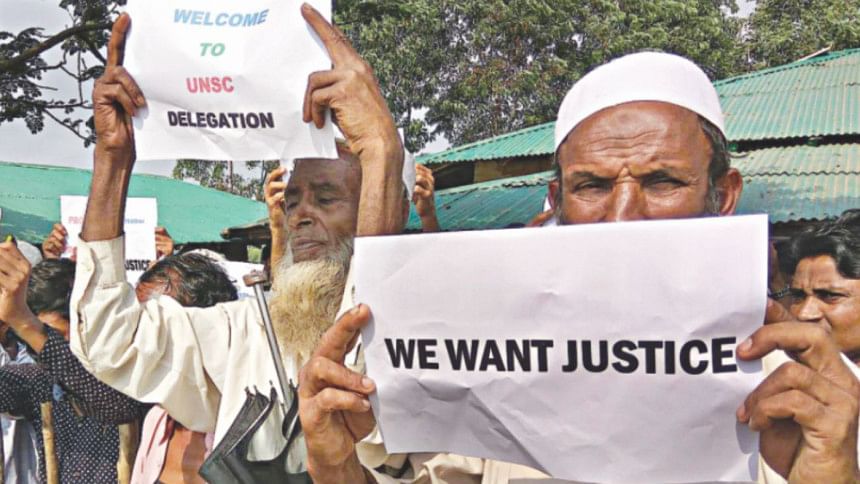
The Guardian reports that Suu Kyi hopes to restore her battered reputation by allowing the UN to enter Myanmar. Her aides hope that the offer, linked to internal political changes strengthening her position and the appointment of a UN special envoy for the crisis, can mark a turning point in her relations with the international community.
In a “historic and highly unusual” move, top diplomats from each of the 15 UNSC member states began a visit to Bangladesh on Saturday and will travel to Myanmar today.
The Permanent Representatives yesterday visited refugee camps in Cox's Bazar and will visit Rakhine state, origin of the Rohingya crisis tomorrow. The UN has described the crackdown on the Rohingyas as ethnic cleansing.
According to The Guardian report, the visiting ambassadors are likely to press Aung San Suu Kyi on the progress she is making in implementing the reforms proposed by the Advisory Commission on Rakhine State, a body she established and which was chaired by former UN secretary general Kofi Annan.
The commission's report called for a review of Myanmar's 1982 citizenship law, which prevents Rohingyas from becoming citizens, and an end to restrictions on the minority group to prevent further violence.

Although inviting members of the UNSC to Rakhine State could ease international criticism against the government for lack of transparency and media freedom, it is important to be prepared for consequences if Myanmar fails to meet their expectations, said Daw Pyone Kay Thi Naing, a member of the Lower House international relations committee in Myanmar, said a recent report by The Irrawaddy.
“Inviting an important international body is an effective method. It might produce good outcomes as well as bad ones. Those who are responsible for tackling the problem should be prepared,” The Irrawaddy quoted her as saying.
In a report headlined “UN envoys eye action on Rohingya refugee crisis” TRT World wrote that the visit puts global spotlight back on the crisis amid warnings by the UN, aid groups and Myanmar's panel of international advisers on Rohingya issues that the coming monsoon season might worsen the humanitarian situation.
Within the UNSC team, there is resistance by Myanmar's allies China and Russia over how involved the 15-member body should be, said the report.

 For all latest news, follow The Daily Star's Google News channel.
For all latest news, follow The Daily Star's Google News channel. 

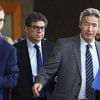
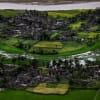
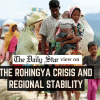

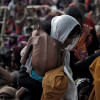


Comments